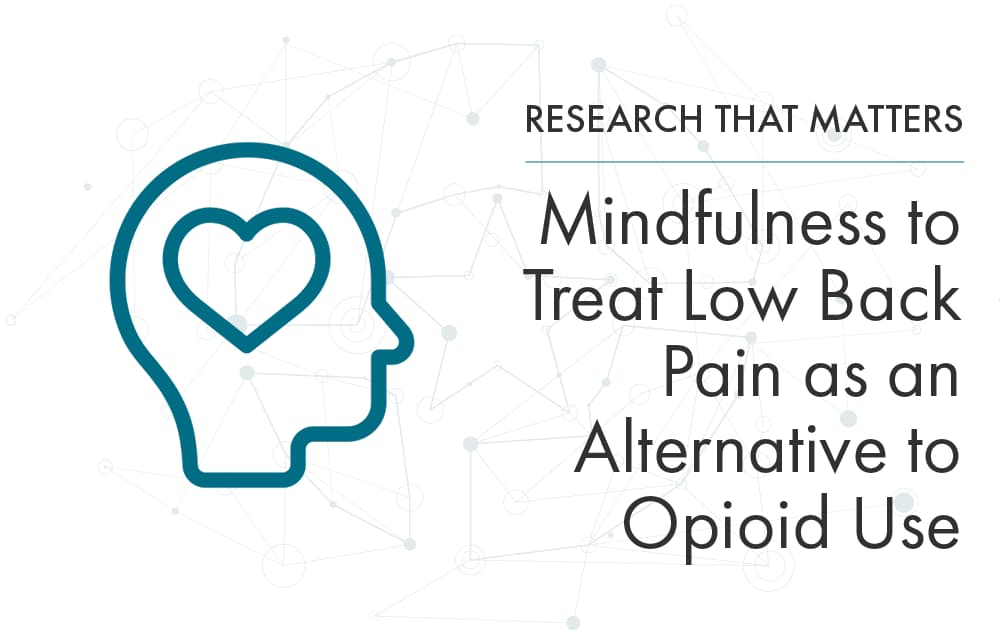20 October 2022
Physical Therapy Researchers Studying Mindfulness in the Treatment of Low Back Pain as an Alternative to Opioid Use
October is National Physical Therapy Month and is celebrated to raise awareness about the many benefits of physical therapy and give appreciation to the therapists that transform lives.
Chronic pain is a common condition for both civilian and military populations alike. Low back pain (LBP) is the most common chronic pain diagnosis, and the one most associated with an opioid prescription in both military and civilian healthcare settings. Because of the prevalence of this diagnosis and concerns with over-prescribing and long-term utilization of opioids, finding alternative treatments would create benefits for all healthcare settings.
A team of Geneva researchers, in collaboration with the University of Utah, are studying nonpharmacologic treatments, including physical therapy and mindfulness techniques to help patients with chronic LBP who undergo lumbar spine surgery. It is hopeful that these treatments will help reduce patient pain and lower the risk for persistent opioid use following surgery. This is important because more than 1 in 3 patients that undergo spine surgery will continue to use opioids long-term after surgery.
Geneva Principal Investigator MAJ (Ret.) Daniel Rhon, PT, PhD, in collaboration with Julie Fritz, PT, PhD at the University of Utah, is conducting a multi-site randomized trial that compares an enriched pain management (EPM) pathway integrating physical therapy and mindfulness to usual care pain management (UC) for persons undergoing surgery for LBP. Dr. Rhon and Geneva Research Scientist Tina Greenlee, PhD, along with their collaborators, recently published a manuscript (detailing the MIND-PT study protocol) in Pain Medicine.
Participants from several military treatment facilities will be enrolled pre-surgery and individually randomized to either the EPM group, who will receive pre-surgical biopsychosocial education and mindfulness instruction, or the UC pain management pathway, who will receive usual pain management care after surgery. The primary outcome will be the pain impact assessed with the Pain, Enjoyment, and General Activity (PEG) scale. Time to opioid discontinuation is the main secondary outcome.
This trial is part of the National Institutes of Health, Helping to End Addiction Long-term (HEAL) initiative focused on providing scientific solutions to the opioid crisis. The initiative is funding hundreds of projects nationwide. Researchers are taking a variety of approaches to tackle the opioid epidemic through understanding, managing, and treating pain as well as improving prevention and treatment for opioid misuse and addiction.
This study is funded through a sub-award from the University of Utah, under Prime Award Number 5UH3AT009763-05 by the National Institutes of Health. The period of performance is 09/22/2020 to 08/31/2023.
Disclaimer: The views expressed do not reflect the official policy of the Army, the Department of Defense, or the U.S. Government.

HIGHLIGHTS
- A team of Geneva researchers, in collaboration with the University of Utah, are studying nonpharmacologic treatments, including physical therapy and mindfulness techniques to help patients with chronic LBP who undergo lumbar spine surgery.
- Principal Investigator Dr. Dan Rhon and Geneva Research Scientist Dr. Tina Greenlee, along with their collaborators, recently published a manuscript (detailing the MIND-PT study protocol) in Pain Medicine.
- This trial is part of the National Institutes of Health, Helping to End Addiction Long-term (HEAL) initiative focused on providing scientific solutions to the opioid crisis.


